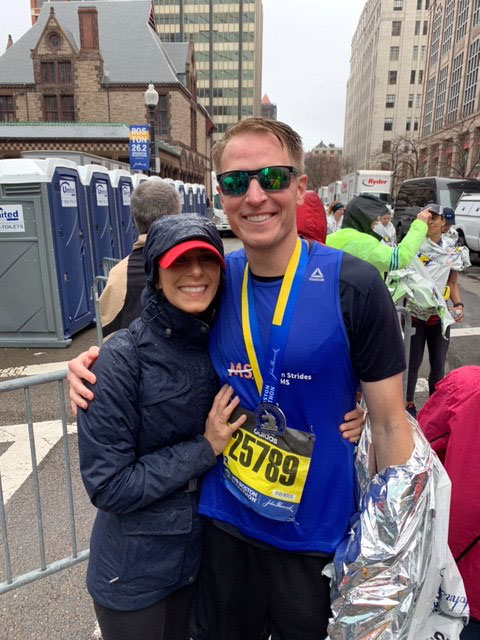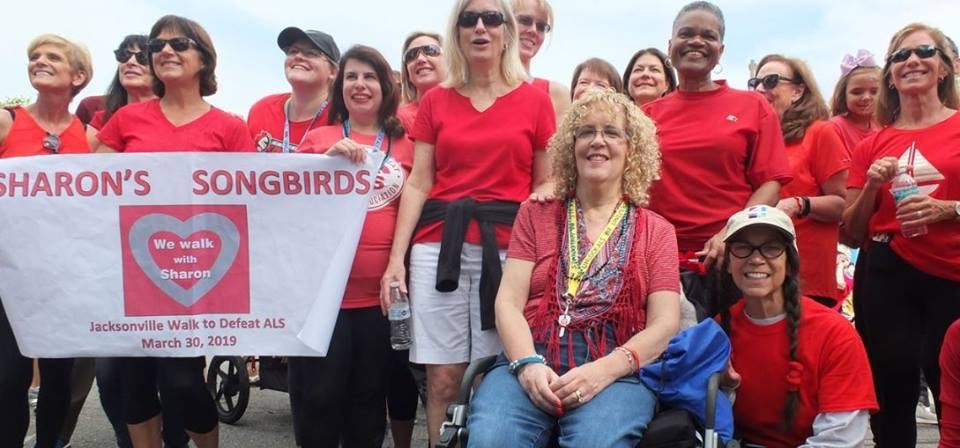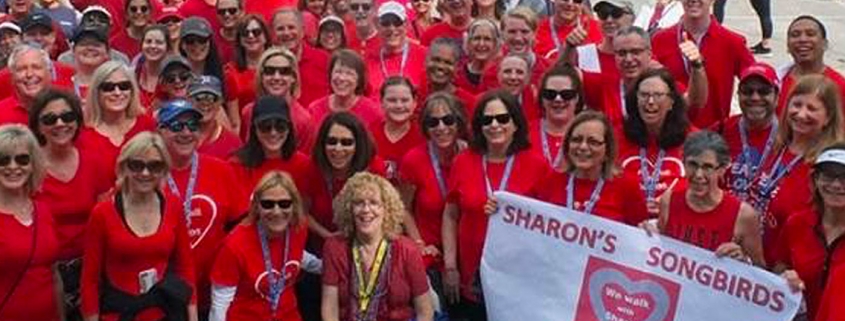Can’t Measure Heart

There’s been a lot of talk recently about the measureables of athletes: height weight, 40-time, shuttle run, bench press. And some talk about production and “getting to the next level.”
As anyone who’s played anything knows one of the best cliché’s in sports is “you can’t measure heart.”
Because you can’t.
That’s why Donnie Horner III and Sharon Siegel-Cohen are such great competitors. One’s an athlete and one’s not. They don’t have much these days in terms of “measureables.”
But they have heart.
Donnie has a form of MS. Sharon has a form of ALS. Yet both compete everyday, get out of their comfort zone, motivate other people and make a difference.
I’ve worked on and off with Sharon for the past 38 years. She’s one of the rare, good people in TV, but you wouldn’t know her if you passed her on the street. She’s what the industry calls a “producer” whose job basically is to make the people on-air look good. And Sharon’s an expert at it.
Never one to get bogged down in the details, she didn’t think a thing of it when during a family trip to NY in June of 2017 she tripped on a sidewalk in the city.
“Everybody trips on the sidewalk in New York,” she told me. “Even though the swelling in my ankle went down I was still limping around in November.”
As the orthopedists and the physical therapists were trying figure out what was wrong with her, Sharon started walking with a cane in February of last year. Eventually they did a nerve conduction study and she ended up at a neuromuscular specialist who diagnosed her nearly a year later with a form of ALS.
Right now, Sharon’s lost the use of her legs and gets around in a wheelchair. “Whether it gets worse, I don’t know,” she said. “I can type and talk. It’s my new reality.”
Her sister Frances, a pretty good athlete in her younger days, now has MS. She jokingly gave Sharon some family ribbing and encouragement noting, “You weren’t much of an athlete anyway!”
Sharon laughed telling me that story, saying, and “She was trying to make me feel good. And she’s right, I was president of the service club and the drama club. It wasn’t that big a thing for girls to be involved in sports when I was younger. I think people with this disease all have a sense of humor.”
Commonly known as “Lou Gehrig’s Disease” ALS has been in public view since the Yankee first baseman retired, making his “I’m the luckiest man on the face of the earth,” speech in 1939.
“That’s 80 years ago,” Sharon remarked. “It’s time something got done.”
That’s why at the recent ALS walk, Sharon was asked to speak and paraphrased Gehrig’s speech in her remarks.

“Today, despite this physical limitation, I feel like the luckiest woman alive,” she said. “I’m surrounded by family friends, colleagues, college friends I haven’t seen in 40 years. I’m buoyed by the love and support I’m getting.”
We often hear announcers refer to the “courage” it takes to hit that shot or the “guts” it takes to make that tackle. That’s amusing when you consider the courage and guts Sharon and others like her have everyday, competing against this kind of disease.
Sharon’s somebody who always sees the big picture. As a producer, she doesn’t sweat the details and lets people do their job. So it was a conscious decision that took some courage to get “in front” of the camera, so to speak, after being in the background her entire career.
“If I can lend my voice, I’ll do it,” she explained. “This disease isn’t incurable, it’s just underfunded.”
Last night, Sharon received the Courage Award at the Augie’s Quest banquet.
“I don’t want to dwell on it,” she added. “I want to stay active, working, reading.”
While September 11th has meaning to all Americans, Donnie Horner III remembers that day in 2009 when he was diagnosed with MS. Horner was an elite athlete, played hockey at the Naval Academy as a four-year starter. He delivered the game ball on the field for the Army/Navy game in his senior year. Club sport athlete of the year, an all-star game starter, Horner was in, as he describes it, “the best shape of my life.”
Then shortly after graduation, as an Ensign on watch aboard the USS Bonhomme Richard during workups for his first deployment, Horner felt his first symptoms of MS. “It felt like my legs had fallen asleep. I thought it was vibration from the steel-toed boots from the vibration of the ship. When it didn’t go away, I decided to get checked out.”
For Horner, the diagnosis was quick. Neurology at NAS Jax, MRI, Cat scan and spinal tap, second opinion at Mayo Clinic. After a promising athletic and academic career, he was retired from the Navy in April of 2010 with relapsing, remitting MS.
“I was cocky as a junior officer but this brought me back to earth,” he explained. “I threw myself into research, I refused to believe that this wasn’t something I could deal with.”
But despite his previous success competing and excelling in athletic competition, this confident, bright, “meet things head on” young Navy officer lost his edge.
“I was a low self-esteem, didn’t know what I was going to do kind of person,” he recalled. “I had to walk with a cane for months. I didn’t know how to give myself a shot. I was scared; I didn’t believe in myself at all. I felt bad physically, mentally and emotionally.”
That’s when he called on his athletic background to restart his life.
“The first five years were brutally hard. I couldn’t recognize I was dealing with insecurity or low self-esteem because I hadn’t ever been that,” he said. “Time has a way of contextualizing things. It was five years before I figured out how to act with this disease.”
So with encouragement from his wife Kristen and his family, some medical and spiritual help, Horner says he’s back at a “good place.”
So good that two weeks ago, Donnie, despite having MS, ran the Boston Marathon.
How is that possible? Courage. Guts.
“I wanted to live my best life,” he explained. “I looked into diet, and exercise. I go to mental health counseling, I took my spiritual affairs seriously.”
Last August, Horner decided he wanted to run the Boston Marathon. Despite the numbness in his leg that’s always there, the tingling and vibrations that come and go, he was diligent in his training. But admits part of it is luck.
“The week before the Boston Marathon I couldn’t get out of bed because of a relapse. Literally. Three days later I felt OK and went back to training,” he explained.
“I’m at my best when I set my goal and get things done,” he added. “The competitiveness and wanting to succeed all comes from playing sports. I enjoy being part of a team. I want to do whatever it takes.”
The “Strides Against MS” team raised $220,000 at the Boston Marathon. Horner alone raised over $9,000. Last weekend he competed in Jacksonville’s version of “Dancing with the Stars.”
“It’s a challenge,” he said of his active lifestyle despite living with MS. “I believe my background as an athlete has contributed to my well being as an MS patient.
And how’d he feel after competing in the Boston Marathon and seeing Kristen at the finish line?
“Like I scored a hat trick. Maybe ten goals! Never been happier since my wedding day.”




